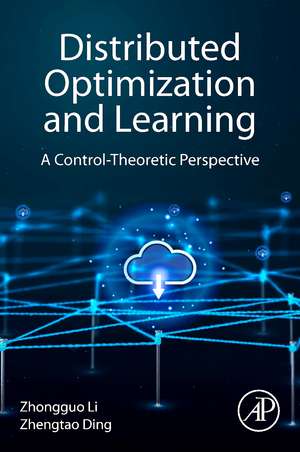Distributed Optimization and Learning: A Control-Theoretic Perspective
Autor Zhongguo Li, Zhengtao Dingen Limba Engleză Paperback – 23 iul 2024
- Provides a series of the latest results, including but not limited to, distributed cooperative and competitive optimization, machine learning, and optimal resource allocation
- Presents the most recent advances in theory and applications of distributed optimization and machine learning, including insightful connections to traditional control techniques
- Offers numerical and simulation results in each chapter in order to reflect engineering practice and demonstrate the main focus of developed analysis and synthesis approaches
Preț: 668.70 lei
Preț vechi: 876.58 lei
-24% Nou
Puncte Express: 1003
Preț estimativ în valută:
127.96€ • 136.83$ • 106.69£
127.96€ • 136.83$ • 106.69£
Carte tipărită la comandă
Livrare economică 11-25 aprilie
Preluare comenzi: 021 569.72.76
Specificații
ISBN-13: 9780443216367
ISBN-10: 0443216363
Pagini: 286
Dimensiuni: 152 x 229 mm
Greutate: 0.39 kg
Editura: ELSEVIER SCIENCE
ISBN-10: 0443216363
Pagini: 286
Dimensiuni: 152 x 229 mm
Greutate: 0.39 kg
Editura: ELSEVIER SCIENCE
Cuprins
Part I. Fundamental Concepts and Algorithms
1. Introduction to distributed optimisation and learning
2. A control perspective to single agent optimisation
3. Centralised optimisation and learning
4. Distributed frameworks. consensus, optimisation and learning
5. Distributed unconstrained optimisation
6. Constrained optimisation for resource allocation
7. Non-cooperative optimisation
Part II. Advanced Algorithms and Applications
8. Output regulation to time-varying optimisation
9. Adaptive control to optimisation over directed graphs
10. Event-triggered control to optimal coordination
11. Fixed-time control to cooperative and competitive optimisation
12. Robust and adaptive control to competitive optimisation
13. Surrogate-model assisted algorithms to distributed optimisation
14. Discrete-time algorithms for supervised learning
15. Discrete-time output regulation for optimal robot coordination
1. Introduction to distributed optimisation and learning
2. A control perspective to single agent optimisation
3. Centralised optimisation and learning
4. Distributed frameworks. consensus, optimisation and learning
5. Distributed unconstrained optimisation
6. Constrained optimisation for resource allocation
7. Non-cooperative optimisation
Part II. Advanced Algorithms and Applications
8. Output regulation to time-varying optimisation
9. Adaptive control to optimisation over directed graphs
10. Event-triggered control to optimal coordination
11. Fixed-time control to cooperative and competitive optimisation
12. Robust and adaptive control to competitive optimisation
13. Surrogate-model assisted algorithms to distributed optimisation
14. Discrete-time algorithms for supervised learning
15. Discrete-time output regulation for optimal robot coordination
